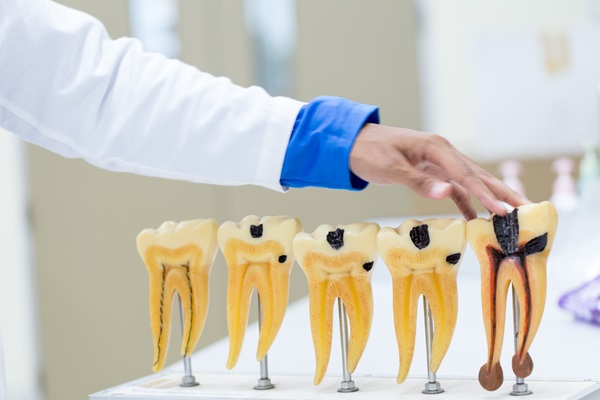Root Canal Infections: The Symptoms and What You Can Do

Root canal infections occur when bacteria reach the central canals of your teeth due to exposure from taking a blow to the mouth or tooth decay. A root canal is a procedure performed for the purpose of repairing or salvaging a seriously decayed tooth or a tooth that has been severely infected. During a root canal procedure, the tooth’s nerve and pulp are extracted before the tooth’s nerves, and inner area is properly cleaned, dried and sealed. Root canal infections should be treated as soon as they are diagnosed before the harmful bacteria penetrate through your tooth’s soft tissue, into the inner nerves and chambers of the tooth.
Common root canal infection symptoms
You have a hunch, but how can you tell that a root canal procedure is needed? One thing you can do is look for the symptoms of a root canal infection. These symptoms include the following:
1. Sensitivity to temperature
One of the first signs is temperature sensitivity when your teeth are exposed to hot or cold beverages and solid foods. The discomfort you may feel when your teeth are exposed to such temperatures is as a result of your teeth’s nerve endings being presented after the enamel gets eroded by bacteria.
2. Persistent toothaches
Having sensitive teeth when exposed to hot or cold foods is one thing, but if the sting persists long afterward, there’s a high chance your root canal is infected. You may either experience the ache as a throbbing sensation or as a persistent, intense pain. Either way, it is a sign that your root canal has been infected and action needs to be taken immediately.
3. Darkening of the tooth
When you notice a discolored tooth in your mouth, it is a sign that you might have a dead tooth. The discolored tooth is a result of poor blood flow caused by tooth decay, root canal infection, and physical trauma.
4. Bad breath
A sure tell-tale sign of a root canal infection is terrible mouth odor. Bad breath comes about as a result of harmful bacteria breaching your teeth’s enamel and entering the root canal. Once the bacteria penetrate the tooth, the resultant infection leads to the emission of awful mouth odor.
5. An abscess
When a root canal infection is left untreated, puss known to go hand in hand with an abscess may begin forming underneath your gums. One side of your cheek may become tender and swollen leading to a lot of discomforts.
What to do
Skipping a root canal procedure could lead to the tissue surrounding the teeth and all over the gum getting infected. Once this happens, an abscess may form, creating an ugly sight and smell. The best thing to do if you have any of the symptoms above is to make an appointment with your dentist so that they can diagnose the problem and decide the best course of action.
Have more questions about a possible infection after having a root canal? Contact our office, and we can answer any additional questions you may have. We can also help in guiding you to make the best decision for your teeth and oral health.
Request an appointment here: https://familycookevilledentist.com or call Dental Partners Cookeville at (931) 650-5686 for an appointment in our Cookeville office.
Check out what others are saying about our dental services on Yelp: Root Canal in Cookeville, TN.
Related Posts
A root canal is one of the most effective treatments for saving a natural tooth and preserving oral health. While they have a negative reputation for being painful, this is no longer the case with modern pain management techniques. General dentists prioritize patient comfort during and after a root canal. Understanding the root canal process…
An emergency dentist is indispensable. You can never know when a dental emergency, such as a broken tooth, will happen. Panic may overwhelm you, but it should not. One of the most common dental emergencies is a broken tooth. If you want to see an emergency dentist for your broken tooth, here are the things…
When you cannot reach an emergency dentist, relying on professional tips can help relieve your toothache. Dental issues can spring up all of a sudden, and when you are in a situation where you cannot access an emergency dentist, effective tips are all you have. Some solutions may be quick-acting, while others may help manage…
A restorative dentist focuses on diagnosing and treating dental problems that affect the function and appearance of the teeth. While general dentistry emphasizes prevention and maintenance, a restorative dentist provides solutions for damaged, decayed, or missing teeth. These services are essential for patients seeking to regain comfort, oral function, and confidence in their smiles. Our…
